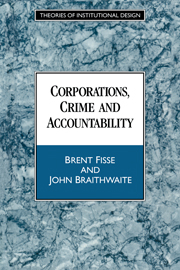Book contents
- Frontmatter
- Contents
- Preface
- Abbreviations
- 1 Crime, Responsibility and Corporate Society
- 2 Individualism
- 3 Enterprise Liability
- 4 Organisation Theory Perspectives
- 5 Making the Buck Stop
- 6 Assessing the Accountability Model
- 7 The Possibility of Responsibility for Corporate Crime
- Bibliography of Cited Works
- Index
2 - Individualism
Published online by Cambridge University Press: 11 March 2010
- Frontmatter
- Contents
- Preface
- Abbreviations
- 1 Crime, Responsibility and Corporate Society
- 2 Individualism
- 3 Enterprise Liability
- 4 Organisation Theory Perspectives
- 5 Making the Buck Stop
- 6 Assessing the Accountability Model
- 7 The Possibility of Responsibility for Corporate Crime
- Bibliography of Cited Works
- Index
Summary
Individualism as a Strategy for Allocating Responsibility for Corporate Crime
For the dogged individualist, the solution to problems of accountability for corporate crime is simple: we should abandon reliance on corporate criminal liability and rely instead on individual liability. Individual criminal liability, it is claimed, can do the job of corporate criminal liability; if corporate criminal liability is abolished, prosecutors will be forced to proceed against individual officers and employees. Moreover, if corporate liability for crime were abolished, and if guilty corporate personnel were held criminally liable, there would be no need to worry about the problem of non-assurance of internal accountability which now arises where corporations are subjected to monetary sanctions. Individualism thus proposes radical surgery—amputating the corporate leg of criminal liability—as the cure for the present ills of nonaccountability for corporate crime.
Many commentators have advocated that criminal liability be confined to individual persons. The early development of corporate criminal liability encountered an adverse reception from some quarters, and the later history of the subject has seen the publication of numerous sceptical tracts, including Leonard Leigh's treatise, The Criminal Liability of Corporations in English Law (1969). In recent times, the support mounted for an exclusively individualistic platform of criminal liability has intensified. In an extensive critique, Eliezer Lederman has contended that recognition of corporate criminal liability challenges ‘the ideological and normative basis of criminal law and its mode of expression and operation’. A related theme has been pursued by Donald Cressey with the claim that the concept of corporate crime is a fiction, the uncritical use of which has saddled criminologists ‘with the impossible task of finding the cause of crimes committed by fictitious persons’.
- Type
- Chapter
- Information
- Corporations, Crime and Accountability , pp. 17 - 58Publisher: Cambridge University PressPrint publication year: 1994

